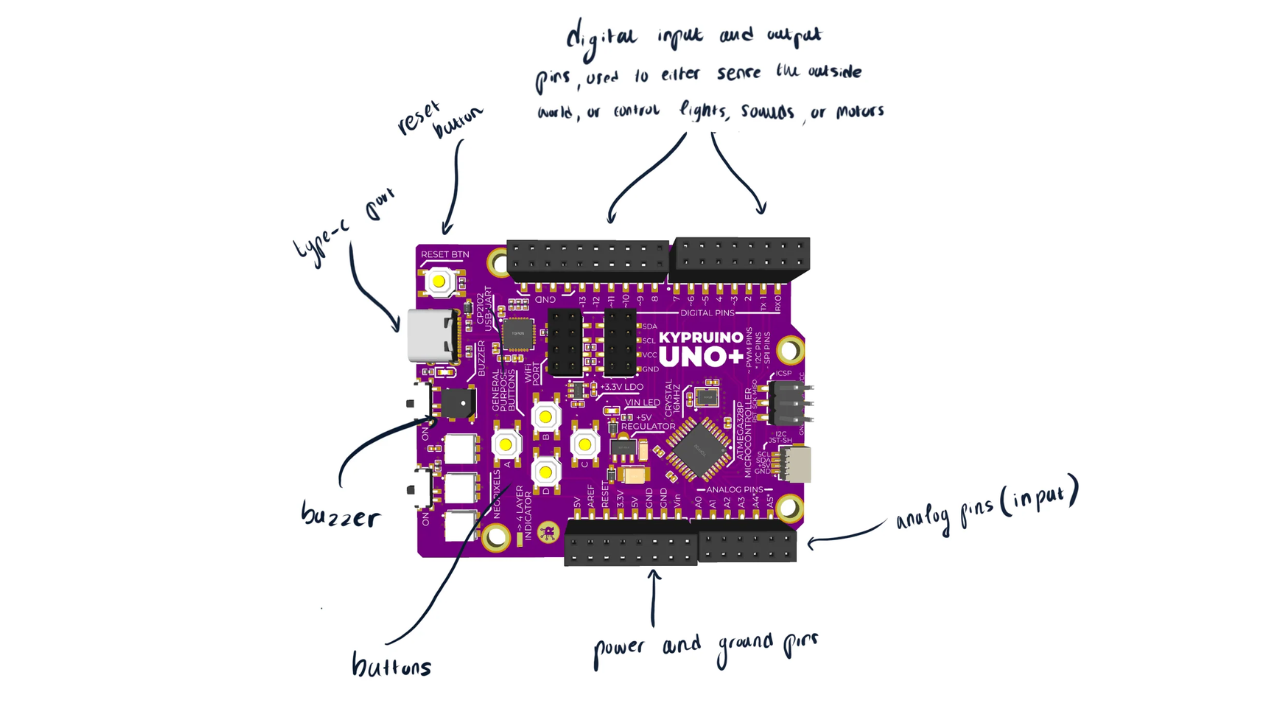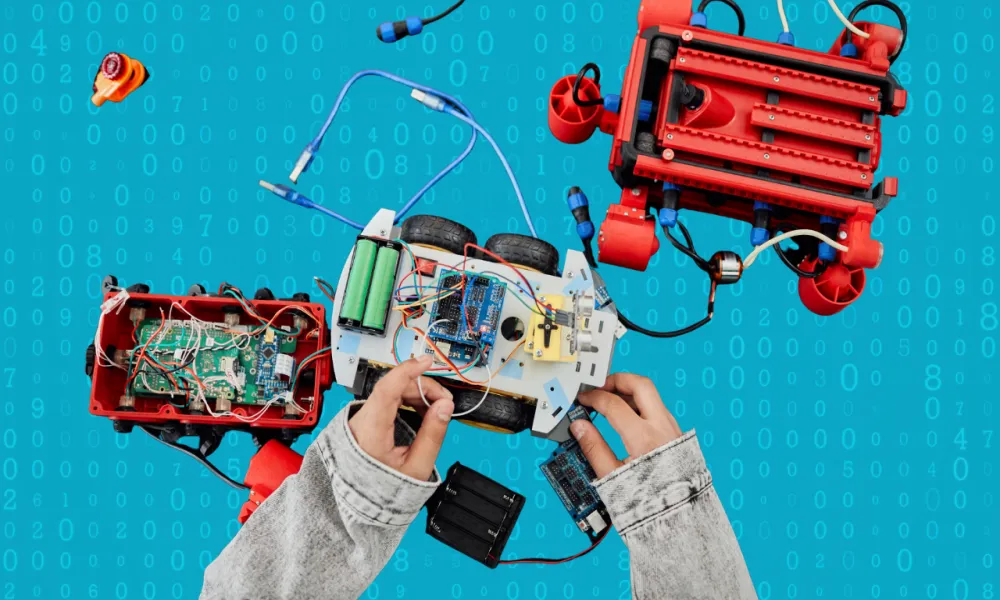In the shadow of its ancient ruins and sunlit shores, Cyprus is assembling its homegrown robotics scene. Largely absent from international headlines, the island’s efforts have begun to solidify into a network of innovation that bridges education, entrepreneurship, and research. At the moment, there are no Silicon Valley unicorns here, but there is traction, and, more importantly, there is direction.
At the centre of this movement is Robo, a Nicosia-based ed-tech company with a sharp focus and a growing following. Originally launched to bring practical ed-tech hardware that would transform a boring tech class into an interesting playful experience into classrooms, Robo has evolved into a vital player in Cyprus’s technology landscape. It has released a suite of products, from programmable tank robots to modular LED pixel displays, but none more significant than the Kypruino.

The Kypruino is the island’s first Arduino-compatible board, showing that hardware innovation can be built locally. Kypruino began as a challenge to build the best Arduino compatible UNO R3 internationally. Its design allows students, hobbyists, and engineers to create robots that sense, move, and respond, whether through line-following cars, automated arms, or smart devices. It empowers communities to learn, experiment, and build solutions for local challenges, fostering both digital literacy and a culture of invention.
On platforms like Instagram, the company showcases projects from local students, blending digital literacy with hands-on design. In a country long focused on service and tourism, this signals a cultural shift toward making, not just consuming.
Special attention is now turning to RoboBlocks, Robo’s most ambitious project yet. Designed as an open-source, modular ecosystem that reimagines how electronics are built and taught, RoboBlocks blends structured hardware families, plug-and-play modules, and an AI learning mentor into a complete STEM-to-research platform.
The project has already drawn international interest, and the Robo team is preparing a Kickstarter campaign set to launch in early 2026, one that aims to bring this ecosystem to classrooms, labs, and maker communities worldwide.
An ecosystem begins to take shape
The momentum around Robo has also sparked a wave of demand for professional-grade technology. Educators and startups increasingly asked for learning kits and for bespoke hardware and full-stack solutions.
In response, Robo created HardwareX, a dedicated spin-off company focused on end-to-end tech creation. Unlike a typical prototyping lab, HardwareX develops complete systems covering design, prototyping, manufacturing, and certification cycles. This expansion signals a growing maturity in Cyprus’s tech landscape, where education-driven innovation is translating into professional engineering capacity.
Robo and HardwareX are not alone. A handful of small companies, many bootstrapped, make up a fragmented but determined robotics sector. CypRobotics, based in Famagusta’s Teknopark, designs bespoke automation solutions for local and international clients.
In Paphos, Digipro has explored robotics since the early 1990s, long before the term became fashionable, and Likeabird in Larnaca With limited manufacturing infrastructure and high import costs, Cyprus’s robotics entrepreneurs favour rapid prototyping and modularity. They tend not to build robots from scratch, but rather to refine, extend, and integrate existing systems for local needs. It’s a quietly pragmatic approach, one shaped by constraints, and one that could prove sustainable.
Research, too, has found a foothold. CYENS, as a crossroad for academic and industrial collaboration. Its mandate spans AI, interactive media, and robotics, and it regularly hosts hackathons, supports early-stage R&D, and backs university research with commercial potential. While CYENS rarely claims the spotlight, its influence is felt across university partnerships and startup formation, linking theory with application, and students with tools.
The KIOS Research and Innovation Center of Excellence at the University of Cyprus anchors another dimension of this ecosystem. Established in 2008 and elevated to a Center of Excellence in 2017 with Imperial College London as a strategic partner, KIOS has secured more than €40 million in Horizon 2020 funding making it the country’s largest ICT research hub.
Its work spans the monitoring, management, and security of critical infrastructure, from power and water networks to telecoms, transportation, healthcare, and emergency systems, always with a focus on applied solutions tested in real-world environments.One example is the OptimRES project, where KIOS is collaborating with Aeolian Dynamics and H. Wise Wire Energy Solutions to build a decision-support platform for renewable energy plants equipped with battery storage. The platform integrates forecasting, planning, bidding, and real-time control tools to tackle challenges of intermittency and grid capacity, ensuring more reliable and profitable integration of wind and solar power.
A pilot site in Cyprus already combines wind turbines, photovoltaics, and storage, with OptimRES providing live data exchange and intelligent control. As it develops further, the project promises to reduce power imbalances, cut penalty costs, and support the island’s, and Europe’s, broader shift toward a decarbonized energy system.
From STEM to strategy
The robotics sector in Cyprus still faces logistical hurdles. Material sourcing can be slow, export paths limited, and funding sporadic. But these obstacles haven’t stifled progress. On the contrary, they’ve encouraged an ecosystem defined less by hype and more by substance.
Educational outreach is a central pillar. Events like Robotex Cyprus showcase student-built machines with surprising sophistication. Platforms like Robots Cyprus provide access to kits and components once only available abroad. Hardware once seen as exotic is now part of the school curriculum. Young makers are learning not just to code, but to build. Not to passively consume technology, but to shape it.
Speaking with Dr. Margarita Chli, Director of the Vision for Robotics Lab, she illuminated the University of Cyprus’ extensive involvement in robotics and robotics research in Cyprus, “While the University of Cyprus and the Cyprus Institute have long contributed to applied and manually driven robotics research, there has recently been a decisive shift toward more fundamental, blue-sky research through ERC projects representing some of the most competitive and prestigious funding in Europe and worldwide. Notably, the University of Cyprus recently won three ERC funded projects in automation, control and robotics amounting to an investment of over €6 million for cutting-edge research in these areas. This transition is crucial, as it promises to attract brain gain, foster innovative and widely applicable solutions, and significantly raise Cyprus’s role and visibility on the international robotics stage.”
While Cyprus does not yet have its own robotics multinationals, it is building the scaffolding for one. The next breakthrough might come from a high school workshop in Paphos or a university lab in Nicosia. The goal is to create capability, not spectacle.
The future is modular
Cyprus’s robotics story is still being written. It is not a revolution in the Silicon Valley sense. There are no billion-dollar valuations or viral apps. Instead, there is something quieter, and arguably more durable, taking form. A community of tinkerers, researchers, engineers, and teachers, scattered throughout Cyprus building tools for education, automation, and possibility.
The Kypruino may grow into a global product. But one thing that is certain is that its message is heard. That a small island can make big things. And that, in time, innovation need not be imported, it can be assembled, programmed, and perfected at home.
